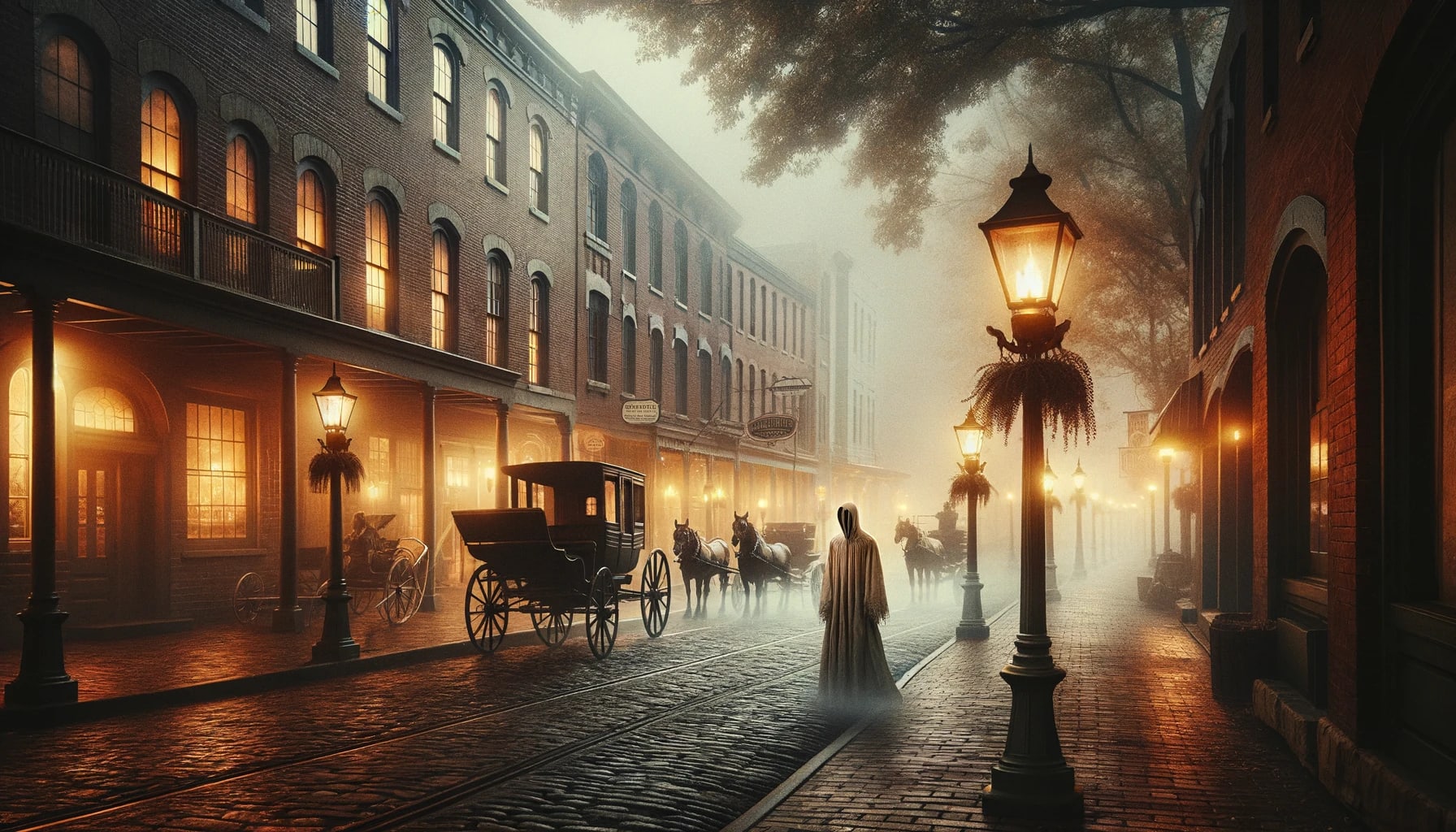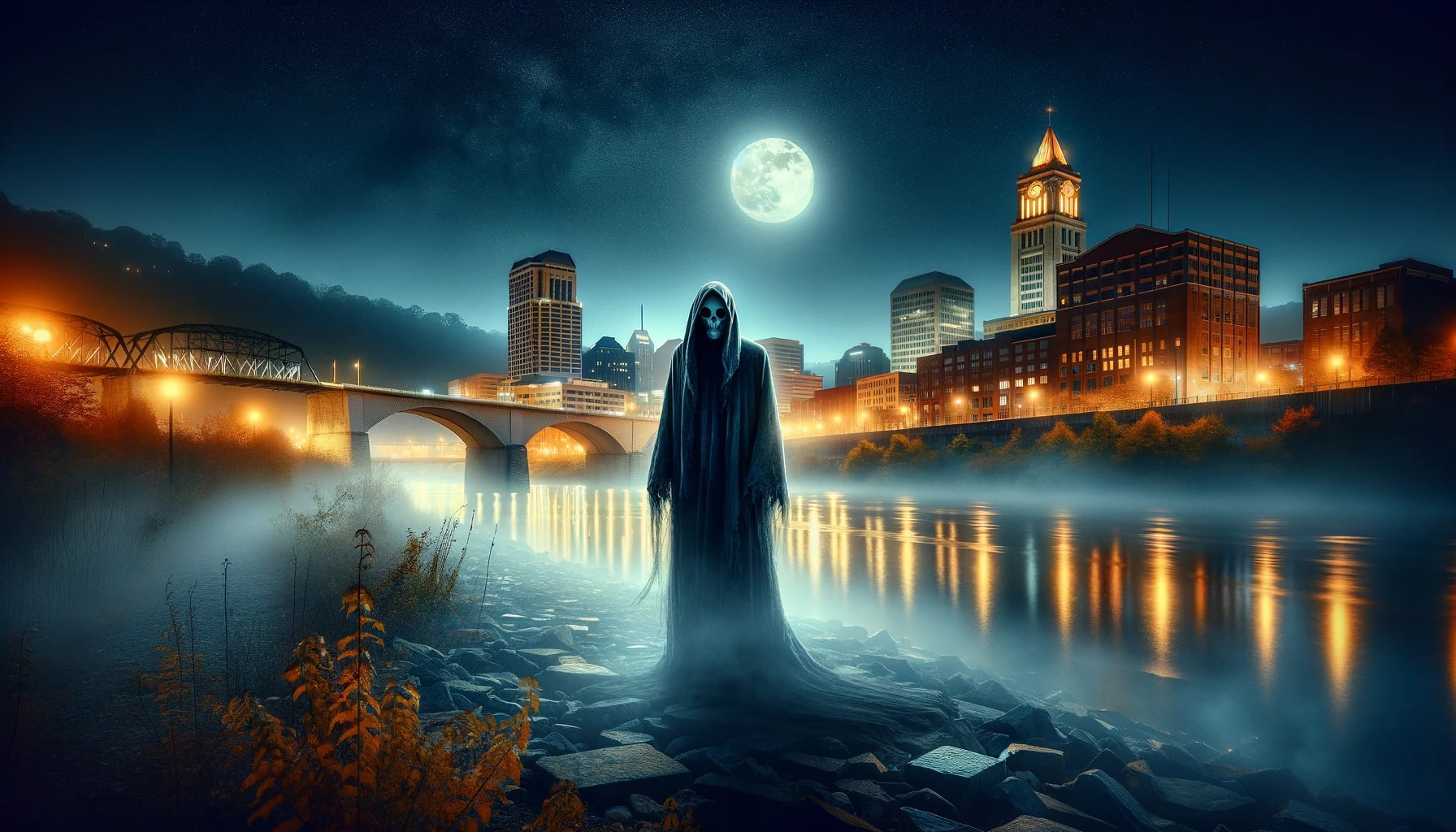Of all the historic hotels in Chattanooga, Tennessee, no other place to stay offers quite the same level of tragedy and hope than the famous Read House Hotel. In the modern day and age, the hotel has slipped into quiet elegance. It's become a place for the wealthy and the elite to mingle with the everyday American or international visitor.
At night, The Read House Hotel glimmers under the starry night--a beacon to all who wish to waltz through its doors and discover what Chattanooga offered during the illustrious Gilded Age of the early 1900s. Silver sconces, elaborately prepared meals in the famous Porterhouse restaurant.
But make no mistake: for as beautiful as The Read House is, it possesses an ugly past that stretches back over 160 years. And, today, this haunted hotel bears the scars--and the spirits--to prove it.
The History of the Read House
Before The Read House even existed, this property at the current-day 827 Broad Street boasted a different hotel together: the Old Crutchfield House.
The Crutchfields in Chattanooga
The Crutchfields knew exactly what they were doing when they constructed an inn just across the street from the new railway station in the mid-1800s.
While an interest in railroads had spiked early on in Tennessee--around the year 1827--a train station did not hit Chattanooga until the late 1840s. Bordering states encouraged Tennesseans to build a railroad of their own, so that their own trains could chug their way through the scenic mountain landscape.
For one, Georgia's Western and Atlantic railway already aimed for the Tennessee River. A train station in Chattanooga meant not only increased traffic but also increased revenue due to imports and exports. So, by 1850, Chattanooga found itself in the midst of an industrial revolution.
The Nashville and Chattanooga (N&C) Railroad launched in Chattanooga in 1854. Other branches were then tacked out in the following years. By 1857, the Memphis and Chattanooga (M&C) was also running regularly through the self-proclaimed "River City."
Chattanooga's Crutchfield family saw opportunity for financial success and grabbed it by the horns. They decided to build a hotel directly across from this new railway--and, considering the fact that the railways at this time were the main source of business and imports, the Crutchfields metaphorically struck gold.
Business at the Old Crutchfield House prospered, but as the Civil War set in so did the first onslaught of drama.
A Battle of the Brothers (and Jefferson Davis, too)
The drama began with Jefferson Davis.
The Civil War was on the brink of exploding when Davis stepped down from his position the US Senate. He'd been recruited for the Confederacy. On his way home to Mississippi, he opted to stop by the Old Crutchfield House to stay the night.
It's not known whether Davis actually launched into political talk at the dinner table or perhaps over brandy, but he did so regardless, spouting off about the merits of the Southern states seceding from the Union.
For the Crutchfield brothers, this was a very sore topic.
William Crutchfield was a firm Union supporter, unlike his brother Thomas. Upon hearing Davis talk, William whipped around and pointed an accusing finger at the would-be Confederate President. He called Davis a "traitor" and a "military despot."
Furious, Davis demanded satisfaction in the form of a duel.
It is perhaps only in thanks to Thomas Crutchfield that neither William nor Jefferson Davis died that day. Thomas snagged his enflamed brother by the arm and dragged him from the room. William calmed, only somewhat, but their dispute only highlighted the differences within the state of Tennessee itself.
Brother pitted against brother. Father against son.
Most historians tend to believe that William Crutchfield never actually enlisted in the fight, but that he did serve as an honorary captain for the Union at the Chickamauga campaign as well as at the Siege of Chattanooga.
As for the tension between the Crutchfield brothers, we're given a little more information into their relationship, thanks to a book written by Elizabeth Lyle Saxon, a close relative of the Crutchfields.
Published in 1905, an excerpt from Saxon's book goes on to claim, "Will Crutchfield, to whom I have been referred, was then a major on the Union General Wilder's staff and twenty-off in number of his blood relations swept up in the gray-clad ranks of the Confederacy, to meet death. But he took no part in the hostilities after the first day, for the reason that he had a serious illness which lasted a week."
But, more interestingly, the passage states: "Years after he learned that his wife, whose sympathies were as strong for the South as his were for the Union, had drugged him heavily, and so prevented his taking further part in the fratricidal strife."
Time Spent as a Hospital
Perhaps it was because William was only one moment away from doing unretractable harm against his brother, but following the argument between him, his brother and Jefferson Davis, the Old Crutchfield House was sold just before the Civil War broke out officially.
Financial prosperity did not come to the hotel's new owners, and, in fact, during the Civil War itself, the property was converted into a makeshift hospital for Union forces in 1863.
For the length of the War between the States, the old Crutchfield House served only the Union troops--and it is this time frame that many believe has made the modern-day Read House Hotel as haunted as it is.
Unfortunately, the inn caught fire and was razed to the ground in 1867. The owners chose not to rebuild. And so it was time for the property to be passed into new hands...
Becoming the Read House Hotel
By 1871, the City of Chattanooga was finally recovering from the losses it felt during the Civil War. And, it was during this same time period that Dr. John T. Read decided to make something of the rubble that was the Old Crutchfield House.
Along with his son, Samuel, the Reads set out to build the finest hotel Chattanooga had ever seen. And, for the most part, they succeeded. Over time, the Read House Hotel became synonymous with opulence and luxury.
It opened officially on New Year's Day in 1872 to the excitement of the locals. The hotel was comprised of "terrazzo floors inlaid with marble, indoor paneling of quarter-sawed walnut, carved and gilded woodwork, mirrors recessed in massive arches and a lobby beautifully defined by its soaring columns."
In 1875, just a few scant years after its grand opening, the Read House felt the despair of the flood that ravaged all of Chattanooga. The Nashville Union and American reported on the second of March that "the water is two feet deep in the post office, and on parts of Market Street four feet run deep. A strong current is running through the Read House (hotel)."
By 1926, the hotel had seen a host of better days. It was in desperate need of restoration, refurbishing. Instead of going through the hassle of a remodel, two architects from the design firm Holabird and Roche, opted to have the Read House Hotel demolished. From there, they began the sketches for a new hotel that could compete with the likes of other early twentieth-century models.
The final construction was a ten-floor, Georgian-style hotel that paid homage to its predecessor. The architects did their best to incorporate some of the fine decor that the first Read House Hotel had boasted. Some pieces, however--like the massive mahogany bar--were unfortunate victims of time and were never replaced.
But one artifact managed to escape the pitfall of the garbage bin.
As the contractors were remodeling the Silver Ballroom on the second floor, they came across pair of sconces. Almost immediately, someone made the decision to toss it. After all, the sconces were wrought-iron, and the Silver Ballroom was intended to be, as one might imagine, silver.
The sconce was saved by the bell(man), Howard Johnson. Johnson had worked at the hotel for twenty-seven years and when he saw that the contractors intended to throw away the sconces, he said, "No, don't take them out. Polish them."
Turns out that they were not wrought-iron at all. After a thorough polishing job, it was discovered that the pair were solid silver. They still can be found in the ballroom today.
As for the ghosts, it's more likely that you'll find them on the third floor.
The Ghosts of the Read House Hotel
You can't have a historic hotel without a few ghosts lurking about--this is a true fact, we promise you. And, should you be curious about The Read House Hotel, know that its haunted legacy is one for the books.
For many guests who stay at this illustrious Chattanooga hotel, their paranormal reports often sway to the standard ghostly activity: cold breezes, shadow figures out of the corner of their eye, and strange noises in the dead of the night.
Others, however, are awakened by something a little more spine-tingling.
In fact, one guest staying at The Read House came forward and claimed that "an odd thing happened in the middle of the night in our room. The toilet gurgled and sounded like it was flushing when nobody was in there. I joked that it must have been the ghost."
A joke it may have been, but it's quite likely that was exactly who had woken this poor guest up.
Other guests have claimed to have experienced similar supernatural activity, as well as seeing ghostly soldiers roaming the halls of the hotel's fourth floor. We can only assume that these shadowy spirits are none other than the residual energy of the soldiers who may have spent their last moments at the Read House when it operated as a Civil War hospital.
But it is one specific room at this historic hotel that strikes the fear into many: Room 311.
The Haunted Room 311
In 2004, The Tennessean reported that guests staying at the Read House Hotel "swear to have felt her presence, and some say they have seen her. Those who have stayed in Room 311 have reported to the desk in the late hours of the night complaining of a strange feeling in the room and claim they cannot fall asleep."
Who is The Tennessean referring to, though?
None other than Annalisa Netherly, whose spirit is said to haunt the Read House's Room 311.
According to local lore, Annalisa's lover first brought her to the hotel sometime in the 1920s--while she was still alive, of course. Some believe that Annalisa was a prostitute, and she quickly took up with another man--sometimes even parading her new love in front of her old suitor.
You can imagine the horror staff must have felt when they attended to Annalisa's room one day and found her dead in the bathtub, her throat slashed open and her head nearly severed from her body. Jealousy, or perhaps revenge, had been at the root of the murder.
Others, however, don't believe this gruesome story and instead believe that Annalisa and her gentleman suitor set themselves up at the Read House Hotel. For a time, they were happy. Until it was her suitor who turned to other women and abandoned Annalisa at the hotel. In this version of the tale, poor Annalisa Netherly died of a heartbroken heart in Room 311.
There's a common thread with both accounts: Annalisa Netherly's ghost still haunts Room 311 and she possesses a particular dislike of men, especially those who smoke.
Uncomfortable sensations of being watched are the most commonly reported activity in Room 311, in addition to the loud noises that wake guests at all hours of the night.
Another Chattanooga urban legend is also attached to Room 311, one that include the famous gangster Al Capone as staying in this haunted room during his federal trial. As the story goes, Capone never mentioned having a run-in with the Read House's resident spirit, but that security bars were placed on the window of Room 311 to ensure that Capone could not escape the feds.
Today, those security bars no longer exist. They were removed during renovations in 2004.
Staying at the Haunted Read House Hotel
If you're looking for a journey into haunted Chattanooga, there is no better place to start than at the Read House Hotel, formerly the Old Crutchfield House. It has been temporary home to famous guests like Oprah Winfrey, Winston Churchill, Charles Laughton, Tallulah Bankhead, Gary Cooper and numerous of other celebrity figures.
And, if you're feeling brave enough, request Room 311 for your own chance to meet the ghost of Annalisa Netherly. Just remember that you do have to request that room at the Read House Hotel, and book ahead if you've got your heart dead set on it.

The historic hotel concealing centuries of tragedy

The infamous corridor leading to Room 311



